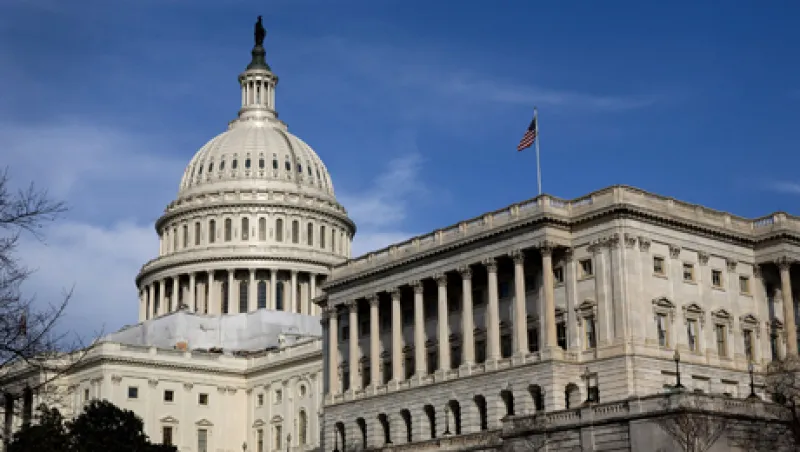The rancorous partisan discussions in Washington aimed at avoiding the fiscal cliff on January 1 may inadvertently target some of the tax preferences that support employer-sponsored retirement plans. Employers and their lobbying arms in Washington are sounding the alarm in an effort to forestall any move that could harm retirement plans and savings incentives.
“I hear a lot of concern being expressed by plan sponsors,” says Alison Borland, retirement solutions and strategies leader for Aon Hewitt, based in Lincolnshire, Illinois. “There’s a tremendous amount of support for the retirement system. Employers appreciate the ability to have the flexibility to design and construct something that will make a possible difference for their employees when they retire,” she adds.
The fear by employers is that any limits on the deductibility of contributions to retirement plans by employers and employees that might be a part of resolving the fiscal cliff or even in broader tax reform next year would hinder the ability of today’s employees to attain retirement security for the future. “When they look at the savings behavior today, they believe more savings is needed, not less,” Borland says. Limiting tax preferences would instead reduce savings, she adds.
If no agreement is reached by January 1 between the Republican speaker of the house and the Democratic president, then tax cuts adopted by Congress during the early years of first Bush Administration, which were extended last year, will expire. A partial payroll tax holiday passed last year and backed by President Obama would also expire.
In addition, spending cuts in a sequestration agreement hammered out in August 2011 in the Budget Control Act will kick in with the expiring tax cuts, as well as new taxes from the Patient Protection and Affordable Care Act, to reduce the nation’s budget deficit next year by $560 billion, according to the Congressional Budget Office. The resulting fiscal shock is likely push the economy back into recession, CBO says. Limits on tax preferences for employer-sponsored plans surfaced in the Simpson-Bowles National Commission on Fiscal Responsibility and Reform’s deficit reduction plan in late 2010 and in President Obama’s proposed federal budget last February, as well as in various deficit-reduction proposals from public policy think tanks.
Various proposals being bandied about in Washington would either cap employee and/or employer contributions to retirement plans — or more broadly put a cap on the total amount of deductions individuals can claim, either for higher income earners or for all tax filers.
The tax code contains a host of provisions that support defined contribution and defined benefit plans, as well as individual savings. Together, these benefits represent one of the largest pools of funds that Washington budget scorers call “tax expenditures,” representing funds that are not taxed as income.
In the current fiscal year of 2013, which began in October, employer-sponsored retirement plans are expected to represent $147 billion in tax expenditures, according to estimates by the Joint Tax Committee in Congress. In addition, a budget category that covers the value of other employee benefits, such as worker’s compensation, disability, personal injury and sick pay, represents another $10.6 billion in tax expenditures. Individual retirement arrangements (IRAs) in all their forms add another $19.2 billion to the tally.
To be sure, no one has publicly targeted any specific retirement plan tax preferences to avoid the fiscal cliff. Even so, they are on the negotiating table. “They are on the table because everything is on the table,” explains Geoff Manville, principal, government relations for Mercer in Washington, D.C. “The sheer size of the tax incentives for retirement savings makes them a target,” he explains.
In spite of years of telling members of Congress how valuable these tax incentives are and often getting promises to keep or expand those incentives from influential politicians, advocates have learned from past experience that retirement plan tax preferences can quickly and unexpectedly end up on the chopping block.
“Any time in history when they’ve looked to cut the deficit, oftentimes the retirement system is used as a piggy bank for other things,” explains Brian Graff, executive director and chief executive officer of the American Society of Pension Professional and Actuaries (ASPPA), in Arlington, Virginia. “It’s robbing Peter to pay Paul,” he adds.
Graff cites as an example the Tax Reform Act of 1986, which reduced limits on contributions to 401(k) plans by 70 percent. “That led literally to ten thousands of 401(k) plans being terminated,” Graff says.
There may be a temptation for budget negotiators to limit the deductibility of contributions for business owners and higher income executives, Graff says. Tax preferences for 401(k) plans, however, are shared with employees under nondiscrimination rules, he points out. “If you reduce the incentives to small business owners, it doesn’t make sense to have the plan any more,” he warns.
ASPPA on November 28 launched a grassroots campaign called “Save My 401(k)” urging more than 60 million participants in 401(k) plans to tell Congress to say no to any cuts in tax preferences for retirement plans.
Worry centers around the fact that an adverse outcome is so difficult to anticipate and can be so potentially harmful. “Experience tells me that some things often happen suddenly at the end [of a budget process] and sometimes in surprising ways,” says Alan Glickstein, senior retirement consultant at Towers Watson in Dallas. “Some things happen that are intended and some things happen that have unintended consequences.”
So it’s not surprising that advocates for employer-sponsored plans have fanned out across Washington and are restating with added urgency their opposition to any tax revenues gained at the expense of retirement plans.
“We appreciate that Congress faces a lot of tough choices, but not all tax expenditures are created equal,” says Jim Klein, president of the American Benefits Council. “Retirement plans do not represent tax breaks and they are not a tax loophole. It is deferred tax revenue that retirees pay when their benefits are paid out in retirement,” he explains.
Under budget scoring, the time horizon for measuring tax expenditures and other budget categories is only 10 years, so the future income from retirement saving does not show up to offset the losses to tax revenues today when they are “scored” as a tax expenditure.
“A lot of tax and revenue discussions are really a finely structured game that has a limited connection to the reality of the situation,” says David John, senior research fellow in retirement security and financial institutions at the Heritage Foundation. The “very artificial construction” for 10-year time frame is one of those disconnects, he adds. “So you look at scoring over a particular period and if you don’t get the right scoring of that particular period, then something is open to being changed.”
Advocates for participants are also worried about reducing tax breaks for retirement plans. “We don’t think they should be eliminated and used for general deficit reduction,” says Karen Friedman, executive vice president and policy director at Pension Rights Center. Instead, Friedman would like to see a portion of those tax preferences redirected from benefiting high earners to be used for refundable savings credits for new retirement savings vehicles that “could expand both coverage and also increase savings for low- and moderate-income earners."
The defenders of the retirement system tend to agree that decisions on taxes affecting retirement plans should be decided on the basis of what constitutes good national retirement policy and not on the basis of tax and budget policy.






